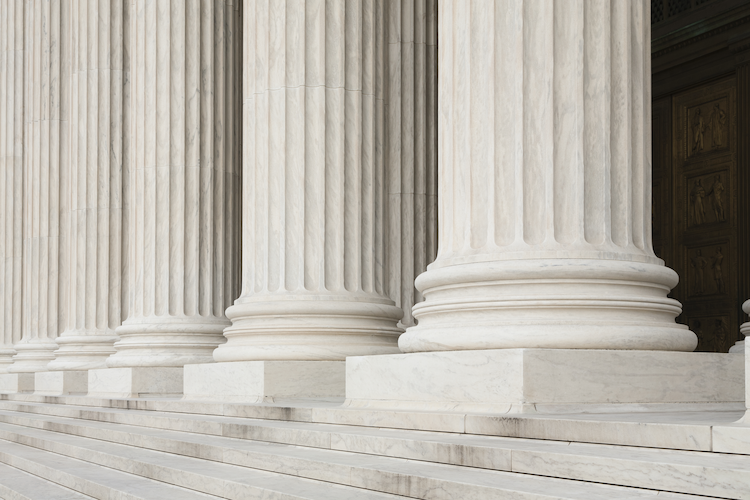SCOTUS Issues First Opinion of the Term

The U.S. Supreme Court issued its first opinion of the 2022-2023 Term. In Arellano v. McDonough, 598 U. S. ____ (2023), a unanimous Court held that the effective date of an award of service-related disability compensation to a veteran of the United States military determined pursuant to 38 U.S.C. §§ 5110(a)(1) and 5110(b)(1) is not subject to equitable tolling.
Facts of the Case
Approximately 30 years after Adolfo Arellano’s honorable discharge from the Navy, Arellano applied to the Department of Veterans Affairs (VA) for disability compensation based on his psychiatric disorders. A VA regional office granted Arellano service-connected disability benefits after finding that his disorders resulted from trauma that he suffered while serving on an aircraft carrier.
Applying the default rule in 38 U.S.C. §5110(a)(1), the VA assigned an effective date of June 3, 2011—the day that the agency received his claim—to Arellano’s disability award. Arellano appealed, arguing that his award’s effective date should be governed by an exception in §5110(b)(1), which makes “[t]he effective date of an award of disability compensation . . . the day following the date of the veteran’s discharge or release if application therefor is received within one year from such date of discharge or release.” Alleging that he had been too ill to know that he could apply for disability benefits, Arellano maintained that this exception’s 1-year grace period should be equitably tolled to make his award effective on or about the day after his discharge from military service in 1981.
The VA’s Board of Veterans’ Appeals denied Arellano’s request, and the Court of Appeals for Veterans Claims affirmed. The Federal Circuit also affirmed the judgment.
Supreme Court’s Decision
The Court affirmed by a vote of 9-0, holding that equitable tolling does not apply to Section 5110(b)(1).Justice Amy Coney Barrett wrote on behalf of the Court.
In reaching its decision, the Court explained that equitable tolling “effectively extends an otherwise discrete limitations period set by Congress” when a litigant diligently pursues his rights but extraordinary circumstances prevent him from bringing a timely action. It also noted that pursuant to Irwin v. Department of Veterans Affairs, 498 U.S. 89 (1990), while the Court presumes that federal statutes of limitations are subject to equitable tolling, this presumption may be rebutted if equitable tolling is inconsistent with the statutory scheme.
The Court did not address whether the Section 5110(b)(1) was a statute of limitations because, even assuming that the exception sets a limitations period, there exists “good reason to believe that Congress did not want the equitable tolling doctrine to apply.” In support, the Court first cited the default rule in Section 5110(a)(1), which states that “the effective date” of veterans benefits “shall be fixed in accordance with the facts found, but shall not be earlier than the date of receipt of application … unless specifically provided otherwise.” The Court further found that the structure of §5110—which sets out 16 exceptions that explain when various types of benefits qualify for an effective date earlier than the default—reinforces Congress’s choice to set effective dates solely as prescribed in the text.
While the Court acknowledged that “hard and fast limits on retroactive benefits can create harsh results,” it also emphasized that Congress has the power to choose between rules, which prioritize efficiency and predictability, and standards, which prioritize optimal results in individual cases.
Previous Articles
Supreme Court Rejects Mexico’s Suit Against U.S. Gun Manufacturers
by DONALD SCARINCI on July 8, 2025
In Smith & Wesson Brands v. Estados Unidos Mexicanos, 605 U.S. ____ (2025), the U.S. Supreme Co...
SCOTUS Sides With Employee in Reverse Discrimination Case
by DONALD SCARINCI on July 2, 2025
In Ames v. Ohio Department of Youth Services, 605 U.S. ____ (2025), the U.S. Supreme Court held tha...
Supreme Court Rejects Moment of Threat Doctrine in Deadly Force Case
by DONALD SCARINCI on June 30, 2025
In Barnes v. Felix, 605 U.S. ____ (2025), the U.S. Supreme Court rejected the Fifth Circuit Court o...
The Amendments
-
Amendment1
- Establishment ClauseFree Exercise Clause
- Freedom of Speech
- Freedoms of Press
- Freedom of Assembly, and Petitition
-
Amendment2
- The Right to Bear Arms
-
Amendment4
- Unreasonable Searches and Seizures
-
Amendment5
- Due Process
- Eminent Domain
- Rights of Criminal Defendants
Preamble to the Bill of Rights
Congress of the United States begun and held at the City of New-York, on Wednesday the fourth of March, one thousand seven hundred and eighty nine.
THE Conventions of a number of the States, having at the time of their adopting the Constitution, expressed a desire, in order to prevent misconstruction or abuse of its powers, that further declaratory and restrictive clauses should be added: And as extending the ground of public confidence in the Government, will best ensure the beneficent ends of its institution.





